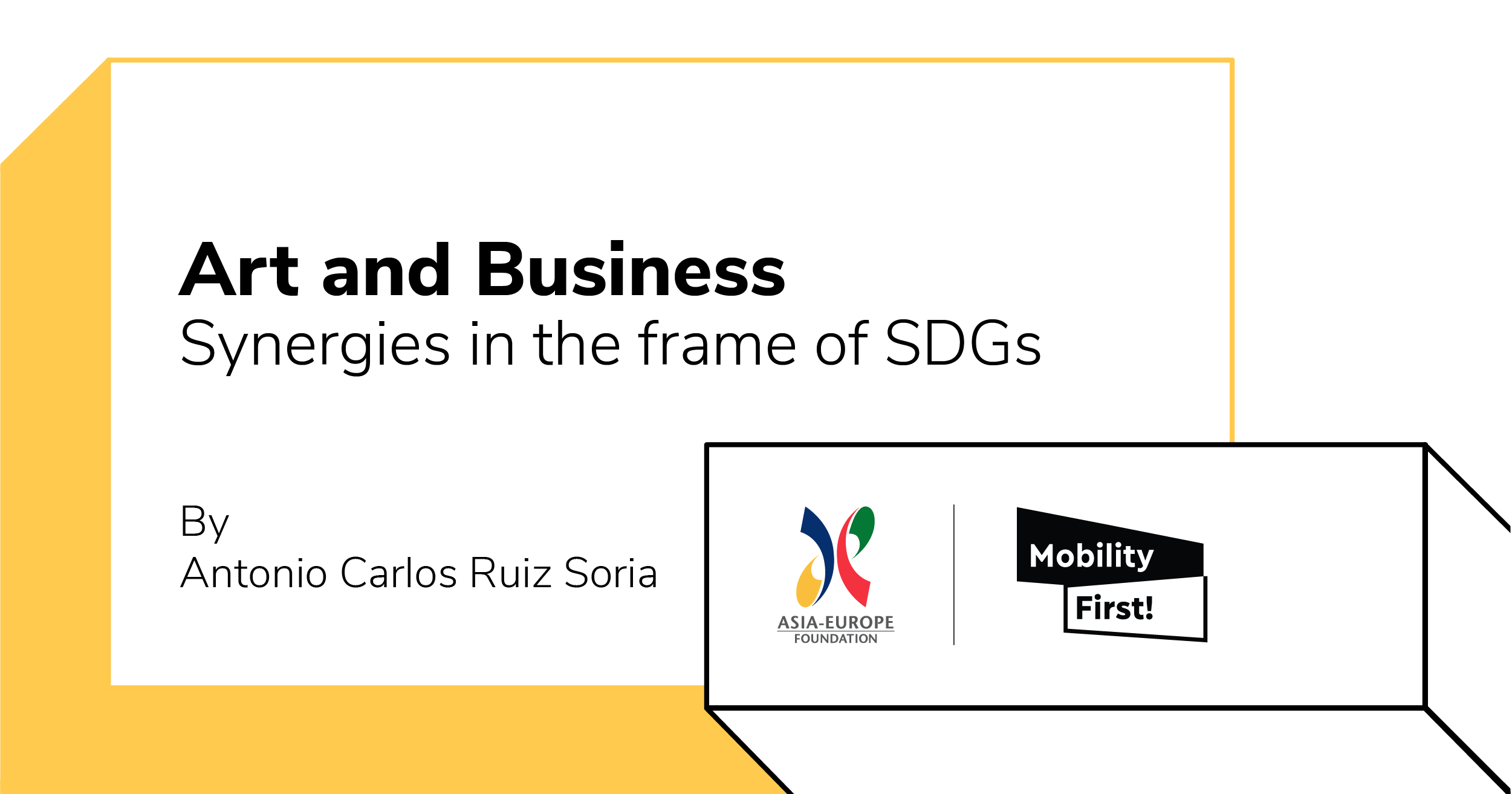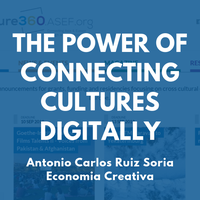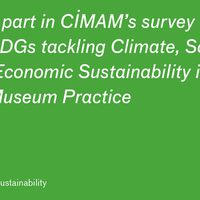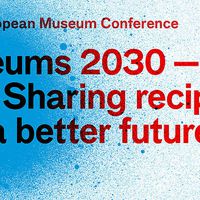Art & Business | Synergies in the frame of Sustainable Development Goals

Art and business, two seemingly disconnected areas for many people, can actually be in alignment for common goals in tackling global challenges.
From social inclusion to gender equality, climate change and the impact of digital technologies in the way we live and work, art and business can join forces in co-creating innovative solutions and establishing win-win partnerships for both sides.
Historically, arts and culture has found support through donations and patronage from business philanthropists. However, when the Great Recession of 2008 took a toll on public budgets, including those dedicated to the arts, many cultural institutions and cultural mobility projects were pushed to seek new sources of support, including from multinational corporations’ (MNC) Corporate Social Responsibility (CSR) programmes. At the same time, the negative consequences of trade and globalisation due to the recession have increased expectations from civil society, consumers and other stakeholders’ from MNCs to increase their commitment and contribution to sustainable development by enhancing positive impacts (e.g. on general livelihood, health and education) and reducing negative effects (e.g. resource consumption, pollution, human rights violations). ‘Doing good’ or giving back to society by engaging in voluntary and philanthropic activities has been perceived as insufficient.
SDGs as a framework for strategic CSR engagement
In the context of ‘doing more’ above ‘doing good,’ the Sustainable Development Goals (SDGs) have provided an integrated framework for strategic CSR engagement.
In September 2015, the United Nations General Assembly adopted a 2030 Agenda for Sustainable Development that includes 17 SDGs. These 17 SDGs with their 169 targets present a universally agreed upon sustainable development vision for 2030; specifically, Goal #17 calls multiple stakeholders both from public and private sectors and civil society to partner for the Goals.
Thus, for the first time, the private sector, including multinational corporations, was represented at the negotiation table and was involved in designing a global sustainable development agenda alongside political and civil society actors.
SDGs recognise the inter-related nature of issues such as poverty, inequality, decent work, gender equality, and ecosystem conservation, as well as the necessity for all societal actors to jointly tackle them.
Across different sectors, from financial and insurance to energy, tourism, ICT, fashion, airlines, health care & beauty, amongst others, MNCs have signed up and committed to actively contributing to achieving the SDGs.
In some cases, notably in the case of Deutsche Bank or BMW, their CSR strategies have a comprehensive arts and culture pillar, through which they sponsor events, support artists’ international mobility, residencies and educational programmes, curate exhibitions and art and culture programmes in their own cultural venues, and provide visibility and access to a network of potential art buyers and collectors.
The integrated approach of the SDGs and a holistic perspective towards the contribution of arts and culture to sustainable development, social inclusion and environmental preservation, can enable scenarios of cooperation - including funding, sponsorship, pro-bono trainings and advice, marketing and public relations support- even in cases in which CSR programmes do not focus specifically on arts and culture. For example, cultural institutions implementing art and gender equality projects can seek funding and cooperation opportunities within an MNC’s CSR programme committed to the SDGs, and particularly to Gender Equality (Goal #5).
What benefits for the private sector?
On the side of the corporations, they also benefit from the collaboration with the cultural sector and supporting cultural mobility projects in many ways. Benefits for corporations include:
● Visibility and ethical brand image, creative branding
● Conversion: research proves conversion ratios from visibility to purchase are higher in the arts than for several well-funded industries like sport
● Global strategic expansion: investing in arts and culture can be beneficial for corporations to enter and adapt their activities to new markets
● Regional development: Funding the arts has a multiplier effect because it indirectly spurs the tourism industry and other affiliated industries
● Influence of artists and creative entrepreneurs, as opinion and trends’ makers
● Consumer trust
● Harnesses creativity and innovation culture in corporations, and employees’ satisfaction and organizational change
● Resource creation, access to talent, creative thinking, and artists & creatives’ community
● Scalability of projects (particularly within cultural mobility)
How can the cultural sector approach the private sector?
Cultural organisations, artists, cultural entrepreneurs, and practitioners have to be aware of the important source of funding and cooperation that MNC’s represent nowadays. In order to optimise the opportunities for partnering with CSR programmes, it is essential to prepare a clear ‘business plan’ for the cultural or entrepreneurial project, which outlines the following:
- Clear objectives - how the project can contribute to or positively impact sustainable development and the achievement of the SDGs
- A dissemination and communication strategy - since corporations will more likely support projects which can guarantee high-quality visibility to key demographics amongst their target audiences.
Therefore, it is essential that cultural organisations understand the power of storytelling and having a strategic audience development plan in order to optimise their cooperation potential with MNC’s through their CSR initiatives.
Another important point for cultural organisations wanting to enable partnerships with CSR programmes is to understand how corporations consider and value the impact of arts and culture to their mission, and how it can help towards the pursuit and achievement of SDGs.
In fact, many MNCs recognise that arts and culture provide an important return on their environment (company culture and employees’ engagement), as well as return on investment (increased consumption), and creative branding. Arts and culture also harnesses creativity, enables change and transformation, generates innovative solutions and technological innovations. Further, ‘values’ and ‘experiences’ are delivered through the arts, contributing to openness and leadership, cultural exchange, social mobility and the development of society in tackling global challenges for the achievement of the SDGs.
In conclusion, the worlds of art & business are more in alignment with each other than what might have been thought of previously. These two areas can explore and implement win-win partnerships in multiple ways, and generate opportunities for artists and cultural professionals, particularly young talent. Facilitating cultural mobility and international cooperation, enable the exchange of best practices and the co-creation of projects that contribute to the advancement of the 2030 Agenda, in particular: tackling global challenges such as quality education for all (Goal #4), gender equality (Goal #5), reduced inequalities within and among countries (Goal #10), and increasing the active engagement of citizens and stakeholders within arts and culture to building a creative society.
Antonio Carlos Ruiz Soria is a leading international expert on creative & digital economy, sustainability and entrepreneurship; founder of Economía Creativa, creativity and innovation consultancy and digital hub. He is a creative thinker and ecosystem maker providing strategic advice, actionable development plans, feasibility studies, research and capacity building (in more than 15 countries) for international organizations, governments, NGOs, startup hubs/accelerators, leading businesses and creative enterprises with a co-creation methodology and cross-sectoral approach. His recent assignments include a Feasibility Study carried out for the Asia-Europe Foundation (ASEF) for private sector funding for its cultural mobility grant, Mobility First! (from which this article is based). www.economiacreativa.eu
For more information about Mobility First! - ASEF's travel grant for artists & cultural professionals, click here: asef.live/mobilityfirst
Similar content
07 Nov 2019 - 10 Nov 2019
deadline
31 Jul 2020
posted on
03 May 2022
from - to
07 Nov 2019 - 10 Nov 2019




